- Home
- Maggie Stiefvater
The Raven King Page 8
The Raven King Read online
Page 8
Back in Henrietta, night proceeded.
Richard Gansey was failing to sleep. When he closed his eyes: Blue’s hands, his voice, black bleeding from a tree. It was starting, starting. No. It was ending. He was ending. This was the landscape of his personal apocalypse. What was excitement when he was wakeful melted into dread when he was tired.
He opened his eyes.
He opened Ronan’s door just enough to confirm that Ronan was inside, sleeping with his mouth ajar, headphones blaring, Chainsaw a motionless lump in her cage. Then, leaving him, Gansey drove to the school.
He used his old key code to get into Aglionby’s indoor athletic complex, and then he stripped and swam in the dark pool in the darker room, all sounds strange and hollow at night. He did endless laps as he used to do when he had first come to the school, back when he had been on the rowing team, back when he had sometimes come earlier than even rowing practice to swim. He had nearly forgotten what it felt like to be in the water: It was as if his body didn’t exist; he was just a borderless mind. He pushed himself off a barely visible wall and headed toward the even less visible opposite one, no longer quite able to hold on to his concrete concerns. School, Headmaster Child, even Glendower. He was only this current minute. Why had he given this up? He couldn’t remember even that.
In the dark water he was only Gansey, now. He’d never died, he wasn’t going to die again. He was only Gansey, now, now, only now.
He could not see him, but Noah stood on the edge of the pool and watched. He had been a swimmer himself, once.
Adam Parrish was working. He had a late shift at the warehouse that night, unloading mason jars and cheap electronics and puzzles. Sometimes when he worked late like this, when he was tired, his mind ran to his life back in the trailer park. Neither fearful nor nostalgic, just forgetful. He’d somehow fail to recall that things had changed, and he would sigh as he pictured driving back to the trailer when his shift ended. Then there would be the jolt of surprise when his conscious mind clicked in with the reality of his apartment over St. Agnes.
Tonight, he once again misremembered his life and had the lurch of recalling he’d improved things, and as relief trickled through him, he remembered instead the Orphan Girl’s frightened face. By all accounts, Ronan’s dreams were often frightening things, and unlike Ronan, she had no hope of waking up. When he’d brought her back to the real world, she must have thought that she, too, had carved herself a new life. But instead they had merely moved her into another nightmare.
He told himself she wasn’t real.
But guilt gnawed at him.
He thought about how tonight he would return to the home he’d made for himself. The Orphan Girl, though, would remain trapped in dreamspace, wearing his old watch and his old fear.
As he picked up the inventory clipboard, thoughts of Cabeswater nagged at him, reminding him that he still needed to consider the origin of that blackened tree. As he signed out, Aglionby pressed at him, reminding him that he still had a three-page paper on economics in the thirties to turn in. As he climbed into the car, the starter whined, reminding him that he needed to take a look at it before it failed entirely.
He didn’t have time to devote to Ronan’s dream urchin; he had problems of his own.
But he couldn’t stop thinking about her.
His thoughts focused as his fingers skittered across the steering wheel in front of him. It took him a moment to realize what was happening, actually, even though he was looking right at it. His hand galloped across the top of the wheel, feeling the edge, testing the pressure of each pad against the surface.
Adam had not told his hand to move.
He made that hand into a fist and pulled it from the wheel. He held his wrist with his other hand.
Cabeswater?
But Cabeswater seemed no more present inside him than it ordinarily did when it wasn’t trying to get his attention. Adam studied his palm in the grotty glow of the streetlight, disconcerted by the image of his fingers scuttling like an insect’s legs without his mind attached to them. Now that he was looking right at his ordinary hand, the lines dark with cardboard dust and metal flake, it seemed like he may have imagined it. Like Cabeswater may have sent him the image.
Reluctantly, he remembered the wording of the bargain he’d made with the forest: I will be your hands. I will be your eyes.
He rested his hand once more on the center of the steering wheel. It lay there, looking strange with the pale strip of skin where his watch had been. It didn’t move.
Cabeswater? he thought again.
Sleepy leaves uncurled in his thoughts, a forest at night, cold and slow. His hand stayed where he had put it. His heart still crawled inside him, though, like the image of his fingers moving of their own accord.
He didn’t know if it had been real. Real was becoming a less useful term all the time.
Back at Monmouth, Ronan Lynch dreamt.
The dream was a memory. Summer-green Barns, lush and messy with insects and humidity. Water fountained up from a sprinkler nestled in the grass. Matthew ran through it in swim trunks. Young. Pudgy. Curls bleached white from the sun. He was laughing in a rolling, infectious way. A second later, another boy hurtled after him, tackling him without hesitation. Both boys rolled, covered with wet pieces of grass.
This other boy stood. He was taller, sinuous, self-possessed. His hair was long and dark and curled, nearly to his chin.
This was Ronan, before.
Here was a third boy, leaping tidily over the sprinkler. Jack be nimble, jack be quick.
Ha, you thought I wouldn’t, Gansey said, resting his palms on his bare knees.
Gansey! This was Aurora, already laughing as she said his name. The same wild laughter as Matthew. She directed the sprinkler right at him, soaking him immediately.
Ronan, before, regarded Ronan, after.
He felt the moment he realized he was dreaming — he heard his electronica pounding in his ears — and he knew he could wake himself. But this memory, this perfect memory … he became that Ronan, before, or the Ronan, before, became the Ronan, after.
The sun kept getting brighter. Brighter.
Brighter.
It was a white-hot electric eye. The world was seared into light, or shadow, nothing in between. Gansey shielded his eyes. Someone emerged from the house.
Declan. Something in his hand. Black in this harsh light.
A mask.
Round eyes, gaping smile.
Ronan remembered nothing of the mask but horror. Something about it was terrible, but he couldn’t remember what right now. Every thought was burning out of him in this nuclear waste of a memory.
The eldest Lynch brother strode out, purposefully, shoes squelching in the soaked lawn.
The dream shuddered.
Declan began to run, right at Matthew.
“Orphan Girl!” Ronan shouted, scrambling to his feet. “Cabeswater! Tir e e’lintes curralo!”
The dream shuddered again. An apparition of a forest superimposed over all of it, a frame snuck into a movie reel.
Ronan pelted across the sick white grass.
Declan reached Matthew first. The youngest Lynch brother tilted his head back to him, trustful, and that was the nightmare.
Grow up, asshole, Declan told Ronan. He slapped the mask on Matthew’s face.
That was the nightmare.
Ronan snatched Matthew from Declan; the dream heaved again. He had the familiar form of his younger brother in his arms, but it was too late. The primitive mask was an effortless part of Matthew’s face.
A raven flew overhead and vanished mid-sky.
It’ll be okay, Ronan told his brother. You can live like that. You can just never take it off.
Matthew’s eyes were unafraid in the wide eyeholes. That was the nightmare. That was the nightmare That was the
Declan tore the mask off.
A tree behind him oozed black.
Matthew’s face was lines and dashes. It was n
ot bloody; it was not horrific; it was simply not a face, and so it was terrible. He was not a person, he was just a drawn thing.
Ronan’s chest was shaking in airless, silent sobs. He had not cried like that for so long —
The dream shuddered. And now it was not only Matthew who had fallen apart; everything was undoing. Aurora’s hands were pointed at each other, all fingers bent backward to her chest — lines, unmade. Behind them, Gansey was on his knees, his eyes dead.
Ronan’s throat was raw. I’ll do anything! I’ll do anything! I’ll do anythi
It was unmaking everything Ronan loved.
Please
In the Aglionby dorms, Matthew Lynch woke. When he stretched, his head hit the wall; he’d rolled right up against it in the night. It was only when his roommate, Stephen Lee, made a noise of grotesque frustration that he realized he was awake because his phone was ringing.
He pawed it to his ear. “Yah?”
There was no reply. He blinked at the screen to see who was calling, then put it back to his ear. Sleepily, he whispered, “Ronan?”
“Where are you? In your room?”
“Dur.”
“I’m serious.”
“Hur.”
“Matthew.”
“Yah, yah, I’m in my room. SL hates you. It’s like two or sumthin’. Whatdya want?”
Ronan didn’t reply right away. Matthew couldn’t see him, but he was curled on his bed back at Monmouth, forehead resting on his knees, one hand gripping the back of his own skull, phone pressed to his ear. “Just to know you’re all right.”
“ ’m all right.”
“Go to sleep, then.”
“Still sleeping now.”
The brothers hung up.
Outside of Henrietta, nestled on the ley line, something dark watched all of this, everything in the Henrietta night, and said, I’m awake I’m awake I’m awake.
The following morning was over-bright and over-hot.
Gansey and Adam stood by the double doors of the Gladys Francine Mollin Wright Memorial Theater, hands folded neatly. They had pulled usher service — just Adam had, really, but Gansey had volunteered to take Brand’s place as the other usher. Ronan was nowhere in sight. Annoyance simmered inside Gansey.
“Raven Day,” said Headmaster Child, “is more than a day of school pride. Because don’t we have school pride every day?”
He stood on the stage. Everyone was sweating a little, but not him. He was a lean, rugged cowboy in the cattle drive that was life, skin striated like the face of a bleached canyon wall. Gansey had long maintained that Child was wasted here. To put such a survivor into a light-gray suit and tie was to throw away the opportunity of putting him, instead, on the back of a buckskin horse and on the inside of a ten-gallon hat.
Adam shot Gansey a knowing look. He mouthed yee haw. They smirked and had to look away from each other. Gansey’s gaze landed right on Henry Cheng and the Vancouver crowd, all seated together near the back. As if feeling his attention, Henry looked over his shoulder. His eyebrow raced upward. Gansey was uncomfortably reminded of how Henry had seen the Orphan Girl in the back of the SUV. He would, at some point, require an explanation, an evasion, or a lie.
“— for this Raven Day,” Child insisted.
Gansey was ordinarily charmed by Raven Day. It was composed entirely of things that he liked: students assembled smartly in white T-shirts and khaki pants like extras from a WWI documentary; hoisting of flags; teams pitted against one another with plenty of hurrahing; pomp, circumstance, in-jokes; ravens painted upon everything. This crop of juniors had made ravens for the entire student body to stage a mock conflict on the common while the school photographers captured shining faces for another year’s worth of promotional materials.
Now, everything in Gansey sang urgently for him to spend his time seeking. His quest was a wolf, and it starved.
“Today is the tenth anniversary of Raven Day,” Child said. “Ten years ago, the festivities we enjoy today were proposed by a student who had attended Aglionby for years. Sadly, Noah Czerny cannot be here today to celebrate, but before the rest of us do, we are fortunate enough to have one of his younger sisters here to tell us a little more about Noah and the day’s origins.”
Gansey would have thought he had misheard if Adam hadn’t peered at him and mouthed, Noah?
Yes, Noah, because here was one of the Czerny sisters climbing onto the stage. Even if Gansey had not recognized her from the funeral, he would have recognized Noah’s elfin mouth, the tiny eyes with the cheery bags beneath them, the large ears hidden behind fine hair. It was odd to see Noah’s features on a young woman. It was odder to see them on anyone living. She seemed too old to be Noah’s younger sister, but it was only because Gansey had forgotten how Noah existed in suspension. He would have been twenty-four now if he had been saved instead of Gansey.
A freshman said something that Gansey didn’t catch and got himself promptly escorted from the theater for his trouble. Noah’s sister leaned into the microphone and said something also too faint to catch, and then said something else that was eaten by a squeal as the sound manager tried to adjust the volume. Finally, she said, “Hi, I’m Adele Czerny. I don’t really have a long speech. I mean, I sat through these things when I was your age, and they’re boring. I’m just going to say a few things about Noah and Raven Day. Did any of you guys know him?”
In unison, Gansey and Adam started to lift their hands and just as quickly dropped them. Yes, they knew him. No, they had not known him. Noah, alive, had been before their time here. Noah, dead, was a phenomenon, not an acquaintance.
“Well, you were missing out,” she said. “My mom always said he was a firecracker, which just meant he was always getting speeding tickets and jumping on tables at family reunions and stuff. He always had so many ideas. He was so hyper.”
Adam and Gansey looked at each other. They had always had the sense that the Noah they knew was not the true Noah. It was just disconcerting to hear how much Noahness death had stripped. It was impossible to not wonder what Noah would have done with himself if he had lived.
“Anyway, I’m here because I was actually the first one he told about his idea for Raven Day. He called me one evening, I guess it would’ve been when he was fourteen, and he told me he’d had this dream about ravens fighting and battling. He said they were all different colors and sizes and shapes, and he was inside them, and they were, like, swirling around him.” She motioned around herself in a whirlwind; she had Noah’s hands, Noah’s elbows. “And he told me, ‘I think it would be a cool art project.’ And I told him, ‘I’ll bet if everybody at the school made one, I bet you’d have enough.’ ”
Gansey was aware that his arm hairs were standing up.
“So they’re swooping and careening and there’s nothing but ravens, nothing but dreams all around you,” Adele said, only Gansey wasn’t sure if she had actually said it, or if he’d heard her wrong and he was just half-remembering something she’d already said. “Anyway, I know he’d like what it is like nowadays. So, um, thanks for remembering one of his crazy dreams.”
She was walking off the stage; Adam was covering one of his eyes with a hand; there was the dutiful double clap that Aglionby students were asked to perform in lieu of unruly applause.
“Let’s go, ravens!” Child said.
This was Adam and Gansey’s cue to open the doors. Students poured out. Humidity and light poured in. Headmaster Child joined them in the doorway.
He shook Gansey’s hand, then Adam’s. “Thanks for your service, gentlemen. Mr. Gansey, I didn’t think your mother could put together this fund-raiser and a guest list by this weekend, but we’re pretty much there. She has my vote for running the country.”
He and Gansey exchanged the sort of comradely smile that comes from having signed legal paperwork together. It would have been a fine moment if it had ended there, but Child lingered, making polite chitchat with Gansey and Adam — his best and his brightest, respectively.
For seven excruciating minutes, they mined the weather, Thanksgiving break plans, and shared experiences in Colonial Williamsburg, and then, finally, exhausted, they parted ways as the juniors appeared with their raven warriors.
“Jesus Christ,” Gansey said, panting a bit from the effort.
“I thought he would never leave,” Adam said. He touched the bottom of his left eyelid, squinting it shut, before looking past Gansey. “If — ah. I’ll be right back. I think I have something in my eye.”
He left Gansey; Gansey set himself free on Raven Day. He found himself at the foot of the stairs where students were receiving ravens. The flock was composed of paper and aluminum foil and wood and papier-mâché and brass. Some birds floated with helium balloon bellies. Some glided. Some teetered on multiple supports, with separate rods to control flapping wings.
Noah had done this. Noah had dreamt this.
“I’m flipping you a bird,” said a junior, handing him a dull black raven made of newspaper tacked to a wooden frame.
Gansey stepped off into the crowd. Noah’s crowd. In a better world, Noah would have been giving that tenth-anniversary introduction.
At eye level, the landscape was all sticks and arms and white T-shirts, the mechanics and gears. But if one squinted into the too-bright sky, the sticks and the students vanished and the expanse was filled with ravens. They swooped and attacked, plunged and lifted, flapped and spun.
It was very hot.
Gansey felt time slip. Just a little. It was just that this sight was so oddly like something from his other life, his real life; these birds were cousins to Ronan’s dream things. It seemed unfair that Noah should have died and Gansey had not. Noah had been living when he was murdered. Gansey had been marking time.
“What are the rules of this battle again?” he asked over his shoulder.
“No rules in war except stay alive.”
Gansey turned; wings flapped past his face. He was hemmed in by shoulders and backs. He could not tell who had spoken, or even, now, without a face to look at, if someone had.

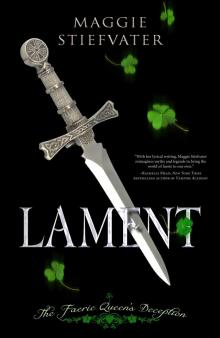 Lament: The Faerie Queens Deception
Lament: The Faerie Queens Deception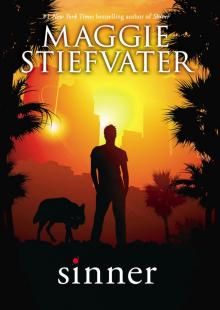 Sinner
Sinner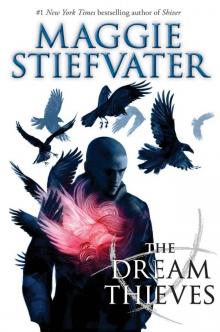 The Dream Thieves
The Dream Thieves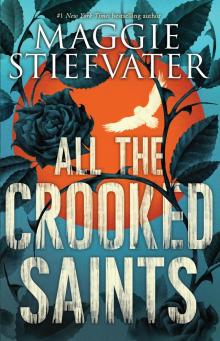 All the Crooked Saints
All the Crooked Saints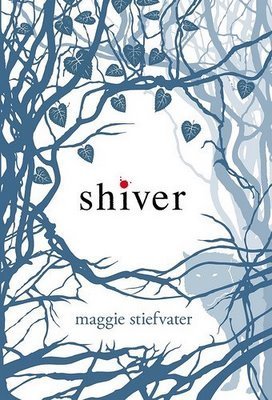 Shiver
Shiver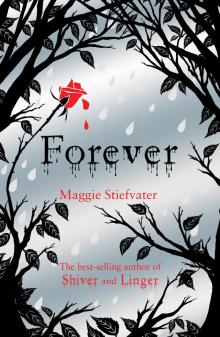 Forever
Forever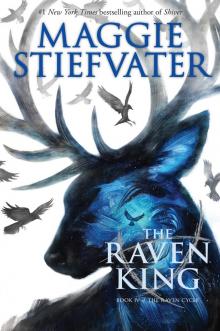 The Raven King
The Raven King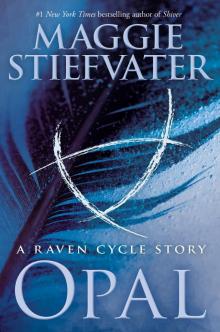 Opal
Opal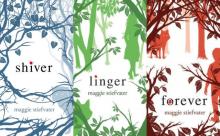 Linger
Linger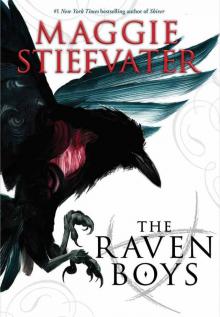 The Raven Boys
The Raven Boys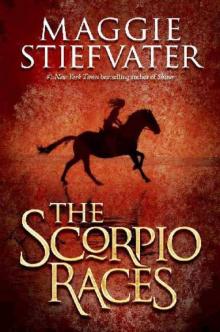 The Scorpio Races
The Scorpio Races Hunted
Hunted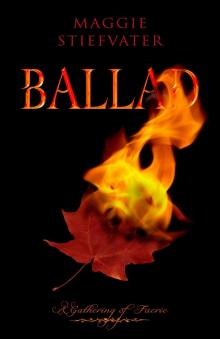 Ballad: A Gathering of Faerie
Ballad: A Gathering of Faerie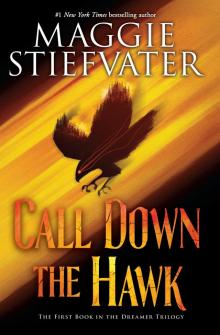 Call Down the Hawk
Call Down the Hawk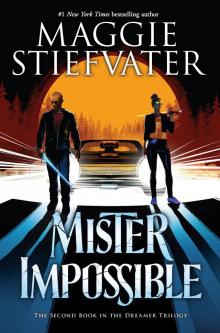 Mister Impossible
Mister Impossible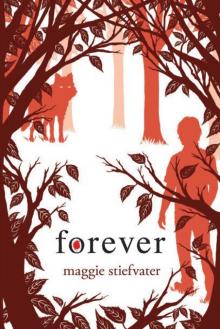 Wolves of Mercy Falls 03 - Forever
Wolves of Mercy Falls 03 - Forever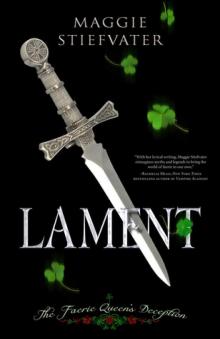 Lament
Lament![Maggie Stiefvater - [Wolves of Mercy Falls 02] Read online](http://i1.bookreadfree.com/i1/04/04/maggie_stiefvater_-_wolves_of_mercy_falls_02_preview.jpg) Maggie Stiefvater - [Wolves of Mercy Falls 02]
Maggie Stiefvater - [Wolves of Mercy Falls 02]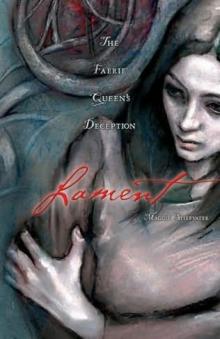 Lament: The Faerie Queen's Deception
Lament: The Faerie Queen's Deception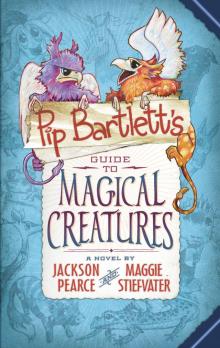 Pip Bartlett's Guide to Magical Creatures
Pip Bartlett's Guide to Magical Creatures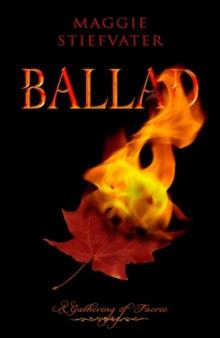 Ballad
Ballad